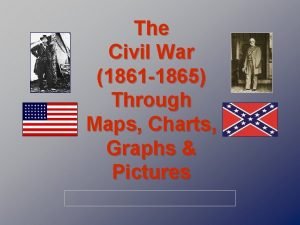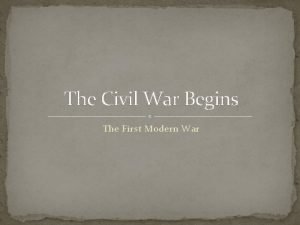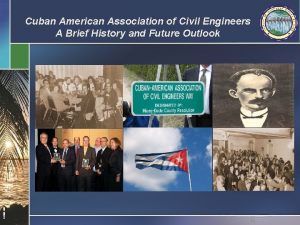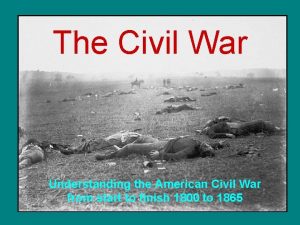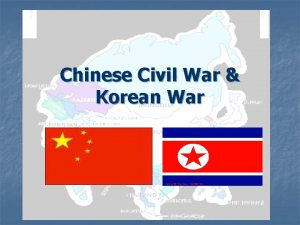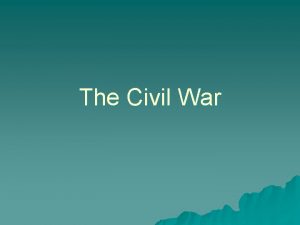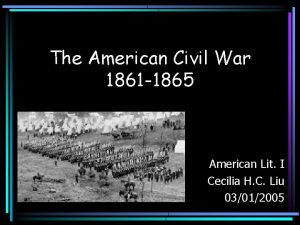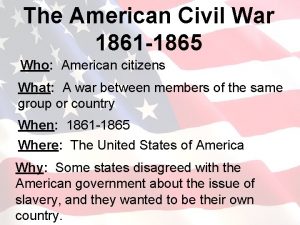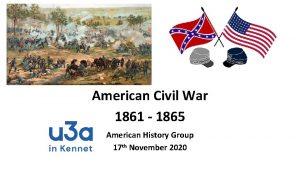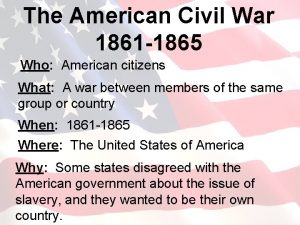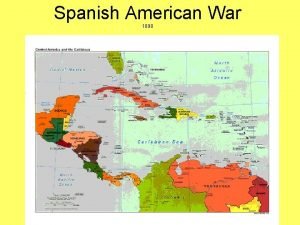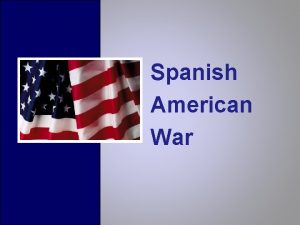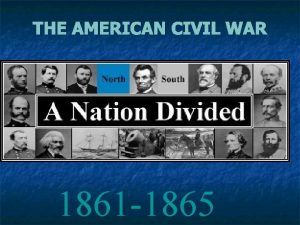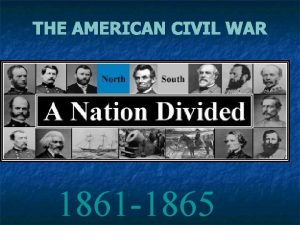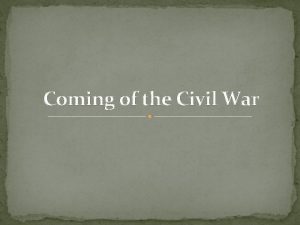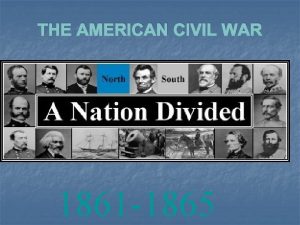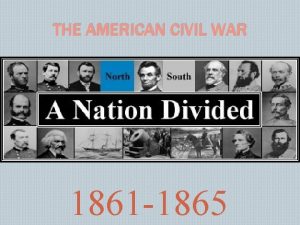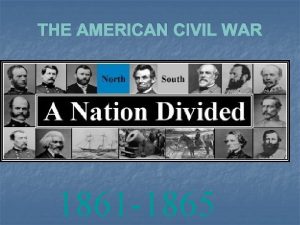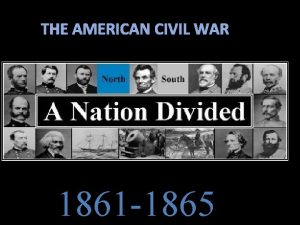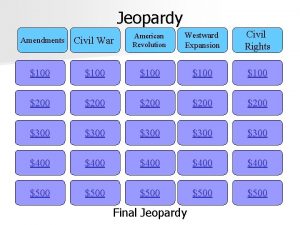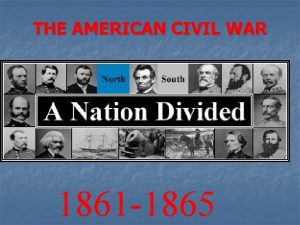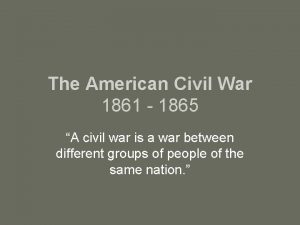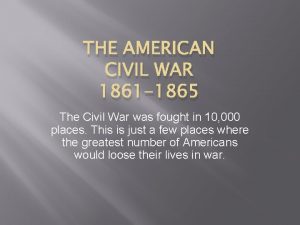The American Civil War Civil War Civil war



























- Slides: 27

The American Civil War

Civil War • Civil war - A civil war is a war between people in the same country.

The Creation of West Virginia • Conflict grew between the eastern and western counties of Virginia. • Many in the western counties were in favor of abolition (against slavery) and against seceding from the Union. • Many disagreements between the two regions of the state led to the formation of West Virginia.

The Creation of West Virginia • In 1863, 50 western counties voted to break away from Virginia and form their own state. • This new state was known as West Virginia and it joined the Union.

Who is Who? • North – United States. • Union – United States. • Army of the Potomac. United States Army. • Federals – United States.

Who is Who? • South – Confederate States of America. • Confederacy – Confederate States of America. • Army of Northern Virginia- Confederate States Army. • Rebels – Confederate States of America.

Both Sides Look for a General • President Lincoln and President Davis both wanted a man from Virginia named Robert E. Lee to command their army! • By 1861, Lee was already a respected military leader in the U. S. Army. • Lee was the man who captured John Brown at Harpers Ferry in 1859!

Robert E. Lee • Lee loved the United States and he thought that slavery was wrong! • However, Lee was from Virginia and he said that he could not fight against his home state. • Lee accepted President Davis’ offer to lead the Confederate Army.

The Civil War in Virginia • After Virginia seceded from the Union, the Confederate States of America moved its capital to Richmond, Virginia. • Many important Civil War battles were fought in Virginia.

Battle of Bull Run (Manassas) • The first Battle of Bull Run (Manassas) was the first major clash of the Civil War. • This is the battle where Thomas “Stonewall” Jackson earned his nickname!

Thomas “Stonewall” Jackson • It is said while the battle raged around him, Thomas Jackson stood calmly, “like a stonewall. ” • “Stonewall” Jackson played an important part in this battle and help lead the Confederacy to a victory at Bull Run.

Thomas “Stonewall” Jackson • He led Confederate troops into many battles. • Jackson was a former officer in the U. S. Army and resigned to join the Confederate Army. • Thomas “Stonewall” Jackson was from Virginia.

J. E. B. Stuart • J. E. B. Stuart was also a former U. S. Army leader. He resigned (quit) his job to join the Confederate Army. • He was the leader of the Confederate Army’s Cavalry. • He was called the “eyes of the army” by Robert E. Lee. • J. E. B. Stuart was from Virginia.

The Civil War in Virginia • The Confederacy had won the first major battle of the war. • This was just one of many battles fought in Virginia.

The Civil War in Virginia • Virginia was a major battleground of the Civil War because much of it lay between the capitals of the two sides – Richmond and Washington, D. C.

The North Sets Up a Naval Blockade of the South • Blockade – the patrolling of an enemy country’s coast by warships to prevent the enemy from sending or receiving weapons, ammunition, reinforcements, or food from other countries.

The North Sets Up a Naval Blockade of the South • Abraham Lincoln used the Union Navy to blockade many important southern ports. • This made it difficult for the South to sell its agricultural products to other countries. They used the money to buy supplies for the army!

Battle at Sea • An important sea battle took place between two iron-clad ships. • The battle took place in Virginia waters near Norfolk and Hampton. (Hampton Roads area) • The Union ship was called the Monitor. • The Confederate ship was called the Merrimack.

Battle at Sea • The battle between the Monitor and the Merrimack was fought to a draw. • A draw means that there was no winner or no loser!

The War Rages On! • Fredericksburg, VA - Lee defeats the Union Army here. • The Union’s economic and manpower advantages begin to take a toll on the Confederate Army. • The naval blockade was strangling the economy of the South.

The Fall of Richmond • Richmond falls to Ulysses S. Grant and the Union Army. In order to keep supplies from falling into the enemy’s hands, the Confederate Army burns the city! • Lee and the Confederate Army retreated to the west!

The War Ends! • The Civil War ended at Appomattox Court House, Virginia. • Lee surrendered his army to Union General Ulysses S. Grant in April 1865. • The war was now over!

Roles of Groups During the U. S. Civil War • Whites, enslaved African Americans, free African Americans, and American Indians all had various roles during the Civil War. • Most white Virginians supported the Confederacy.

Roles of Groups During the U. S. Civil War • The Confederacy relied on enslaved African Americans to raise crops and provide labor for the army.

Roles of Groups During the U. S. Civil War • Some free African Americans felt their limited rights could best be protected by supporting the Confederacy. • Many freed African Americans fought for the U. S. Army.

Roles of Groups During the U. S. Civil War • Most American Indians did not take sides during the Civil War.

Virginia’s Connection to the Civil War Today • You may recognize this common road sign in Virginia. Tourists come from around the world to learn about Virginia’s role in the U. S. Civil War!
 American civil war battles map
American civil war battles map Civil war first modern war
Civil war first modern war Chapter 16 lesson 2 challenges to slavery
Chapter 16 lesson 2 challenges to slavery Civil rights webquest
Civil rights webquest Cuban american civil engineering association
Cuban american civil engineering association Sơ đồ cơ thể người
Sơ đồ cơ thể người Số nguyên tố là số gì
Số nguyên tố là số gì đặc điểm cơ thể của người tối cổ
đặc điểm cơ thể của người tối cổ Tỉ lệ cơ thể trẻ em
Tỉ lệ cơ thể trẻ em Phối cảnh
Phối cảnh Các châu lục và đại dương trên thế giới
Các châu lục và đại dương trên thế giới ưu thế lai là gì
ưu thế lai là gì Kể tên các môn thể thao
Kể tên các môn thể thao Tư thế ngồi viết
Tư thế ngồi viết Bàn tay mà dây bẩn
Bàn tay mà dây bẩn Hát kết hợp bộ gõ cơ thể
Hát kết hợp bộ gõ cơ thể Mật thư anh em như thể tay chân
Mật thư anh em như thể tay chân Tư thế ngồi viết
Tư thế ngồi viết Thẻ vin
Thẻ vin V cc cc
V cc cc Voi kéo gỗ như thế nào
Voi kéo gỗ như thế nào Thơ thất ngôn tứ tuyệt đường luật
Thơ thất ngôn tứ tuyệt đường luật Từ ngữ thể hiện lòng nhân hậu
Từ ngữ thể hiện lòng nhân hậu Hươu thường đẻ mỗi lứa mấy con
Hươu thường đẻ mỗi lứa mấy con Thế nào là hệ số cao nhất
Thế nào là hệ số cao nhất Diễn thế sinh thái là
Diễn thế sinh thái là Vẽ hình chiếu vuông góc của vật thể sau
Vẽ hình chiếu vuông góc của vật thể sau Ng-html
Ng-html
